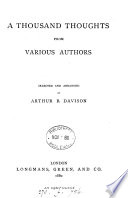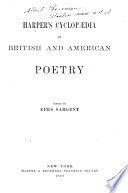 Happy the man, and happy he alone, He, who can call to-day his own : He who, secure within, can say, To-morrow do thy worst, for I have lived today. Happy the man, and happy he alone, He, who can call to-day his own : He who, secure within, can say, To-morrow do thy worst, for I have lived today.  The Complete Art of Poetry: In Six Parts, I. Of the Nature, Use, Excellence ... - Page 251by Charles Gildon - 1718Full view The Complete Art of Poetry: In Six Parts, I. Of the Nature, Use, Excellence ... - Page 251by Charles Gildon - 1718Full view - About this book
 | John McGovern - 1880 - 762 pages
...Notice how Dryden started the following ball rolling in English, Horace having originated the idea : Happy the man, and happy he alone, He who can call to-day his own : He who, secure within, can say, To-morrow, do thy worst, for I have lived to-day. Be fair or foul, or rain,... | |
 | Arthur B. Davison - 1880 - 396 pages
...They appear in the head as if they had been seeking one another. Lander, Cleone to Aspasia. HAPPINESS. HAPPY the man, and happy he alone, He who can call to-day his own : He who, secure within, can say, To-morrow do thy worst, for I have lived to-day. Be fair, or foul, or rain,... | |
 | Quintus Horatius Flaccus - 1880 - 320 pages
...are from their old foundations torn, And woods, made thin with winds, their scatter'd honours mourn. Happy 'the man, and happy he alone, He, who can call to-day his own : He who, secure within, can say To-morrow do thy worst, for I have lived to-day ! Be fair or foul, or rain or... | |
 | Old favourites, Matilda Sharpe - 1881 - 438 pages
...Truth has such a face and such a mien, As to be loved needs only to be seen. AFTER HORACE. III. 29. Happy the man, and happy he alone, He who can call to-day his own ; He who, secure within, can say, To-morrow do thy worst, for I have lived to-day. From the EPISTLE TO SIR GODFREY... | |
 | 1881 - 300 pages
...half-a-crown in English money ; a French franc being equal to tenpence, nearly. IMPROVE THE PRESENT MOMENT. HAPPY the man, and happy he alone, He who can call to-day his own : He who, secure within, can say, TO-MORROW ! do thy worst, for I have lived TO-DAY ! Be fair or foul, or rain... | |
 | Horace - 1881 - 420 pages
...genius of Dryden, and his peculiar mastery of the great rhythmical resources of our language : — ' " Happy the man, and happy he alone, He, who can call to-day his own ; He, who, secure within, can say, To-morrow do thy worst, for I have lived to-day. Be fair, or foul, or rain,... | |
 | George Saintsbury - 1881 - 216 pages
...than one of his characters. Indeed, the three last stanzas of this are well worth quotation, — THL Happy the man, and happy he alone, He, who can call to-day his own ; He who, secure within, can say, To-morrow do thy worst, for I have lived to-day ; Be fair, or foal, or rain,... | |
 | Epes Sargent - 1881 - 1000 pages
...are from their old foundations torn ; And woods, made thin with winds, their scattered honors mourn. oh my soul, devoutly thiuk, How, with affrighted ey secure within, can say, To-morrow, do thy worst, for I have lived to-day ! Be fair or foul, or rain... | |
 | Evan Daniel - 1881 - 420 pages
...predicatively, eg— The way was long, the wind was cold, The minstrel was iafirm and old. — Scott. Happy the man, and happy he alone, He who can call to-day his own. — Dryden. Adjectives used predicatively usually follow the word which they qualify, but may precede... | |
 | Epes Sargent - 1882 - 1002 pages
...are from their old foundations torn ; And troods, made thin with winds, their scattered honors mourn. Happy the man, and happy he alone, He who can call to-day his own ; He who, secure within, can say, To-morrow, do thy worst, for I have lived to-day! Be fair or foul, or rain... | |
| |